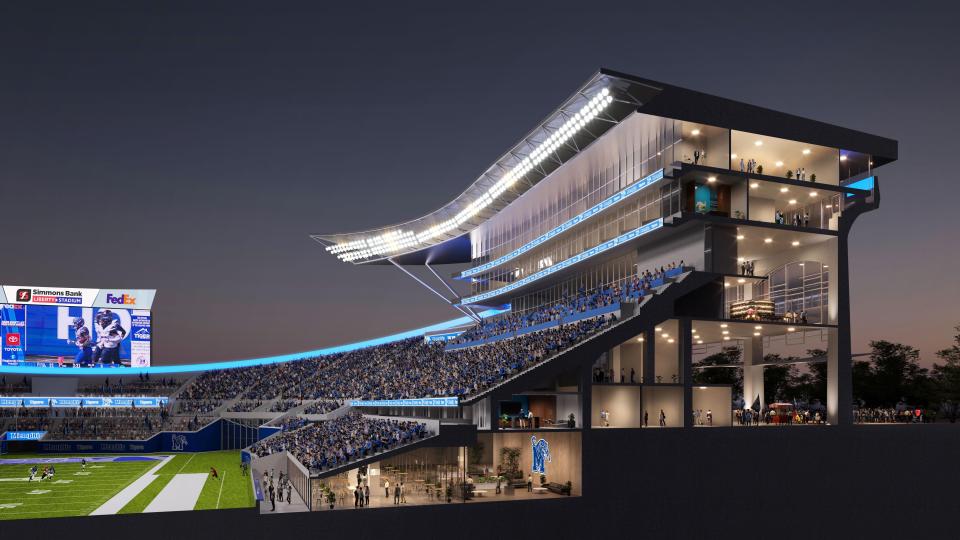Memphis president's reassuring words reveal unsettling truth for Tigers athletics | Giannotto
There wasn’t really anything University of Memphis could say to make this feel better, not after yet another rejection.
But it isn't giving up.
That’s the good news. Maybe the only good news.
The university's leaders won't give up on conference realignment. Not after the Big 12 shunned Memphis for a third time in seven years. Not after Memphis went nowhere during the most significant upheaval in college athletics. Not after SMU – SMU!!! – appears to be on the verge of bypassing Memphis and joining the ACC. Not after decades of this wild goose chase trying to find the conference Memphis deserves.
“A lengthy or uncertain process will not deter us from making the case for the University of Memphis to receive fair consideration,” university president Bill Hardgrave wrote in an op-ed published by The Commercial Appeal. “A lesser fan base might throw in the towel. But that’s not true for our base of supporters, nor is it the right strategy for the university.”
Stay the course. That’s what Memphis fans have heard for years. The past few, it sometimes morphed into this notion that Memphis has never been better positioned for conference realignment. It sounded nice, perhaps even logical. But staying the course also got Memphis here, stuck in a league with nobody it actually should be affiliated with anymore.
It’s why Hardgrave’s op-ed, despite its good intentions after the chaotic past month in college athletics, feels like another reminder of how unsettling this has been – and could still be.
It included, in addition to a rallying cry for the future, the most significant public acknowledgement of what kept Memphis out of the Big 12 in 2021, when Cincinnati, Houston and UCF all got the call.
“There were ongoing NCAA compliance issues, a glaring need to improve our football stadium, and the university was still awaiting the R1 designation,” Hardgrave wrote.
All that, he noted, has been rectified now. Sort of.
Memphis basketball and Penny Hardaway emerged from their James Wiseman-related IARP investigation relatively unscathed. Memphis was designated one of the top research institutions in the country, a credit to the academic gains made by the university over the past decade. And Simmons Bank Liberty Stadium is scheduled to undergo a $150 to $200 million facelift, courtesy of money granted by the Tennessee State Assembly.
Emphasis on scheduled.
For the first time, Hardgrave seemed to concede there’s some doubt about how the planned renovations will proceed.
“We are approaching a key facilities deadline as the Mayor’s Office and City Council work to ensure our $200 million appropriation stays on track for Simmons Bank Liberty Stadium improvements,” Hardgrave wrote. “We are grateful to our partners within the city government who have worked diligently to secure state funding for the stadium renovation. We are also grateful to our partners in the Tennessee General Assembly for appropriating this investment and prioritizing conference realignment efforts. Advancing this investment forward soon is critical to maintaining our viability in current and future realignment.”
This was strategic, of course, even if it hinted at the uncertainty surrounding behind-the-scenes negotiations taking place over the future of FedExForum between the city and the Memphis Grizzlies. Hardgrave is lobbying to ensure the university still gets a big enough piece of that $350 million in state money, especially after being left out in the cold again by the money-grubbing powers-that-be in college sports.

Hardgrave’s op-ed compares conference realignment to the rolling admissions process “with no clear endpoint.” He emphasized how important it still will be for fans to remain engaged, and to reverse the declining attendance trends at Memphis football games.
“The process is also dictated by university presidents working together to reach a consensus about each move," he wrote. "It won’t be finished until all university presidents determine a collective endpoint."
It sounds nice. But it discounts that university presidents can only reach a consensus if their television partners say it’s OK to reach a consensus. And those television partners only say it’s OK if they can make more money off the deal.
That gets at the real tragedy about this week’s developments, about the distinct possibility SMU – and Stanford and Cal – will join the ACC strictly because of money.
OPINION: Can Memphis football become the best bargain in town again?
If SMU does get into the ACC, it’s going to do so by paying its way in. By giving up hundreds of millions of dollars in television revenue because a group of wealthy donors are willing to make up the difference. By doing something similar to what Memphis tried to do in 2016 with the Big 12, when FedEx was reportedly willing to offer significant sponsorship incentives for the league if the Tigers were to be added as members. It didn’t work for Memphis then. It’s apparently enough for SMU now.
It leaves Memphis in about the worst spot anybody could have imagined just a few years ago – all alone. The like-minded AAC schools, the ones that aspired for more than what the establishment was willing to give, are all but gone now.
If that doesn’t sound reassuring, well, that’s because it's hard to be at the moment.
You can reach Commercial Appeal columnist Mark Giannotto via email at mgiannotto@gannett.com and follow him on Twitter: @mgiannotto
This article originally appeared on Memphis Commercial Appeal: For Memphis Tigers, Bill Hardgrave op-ed reveals unsettling truth

